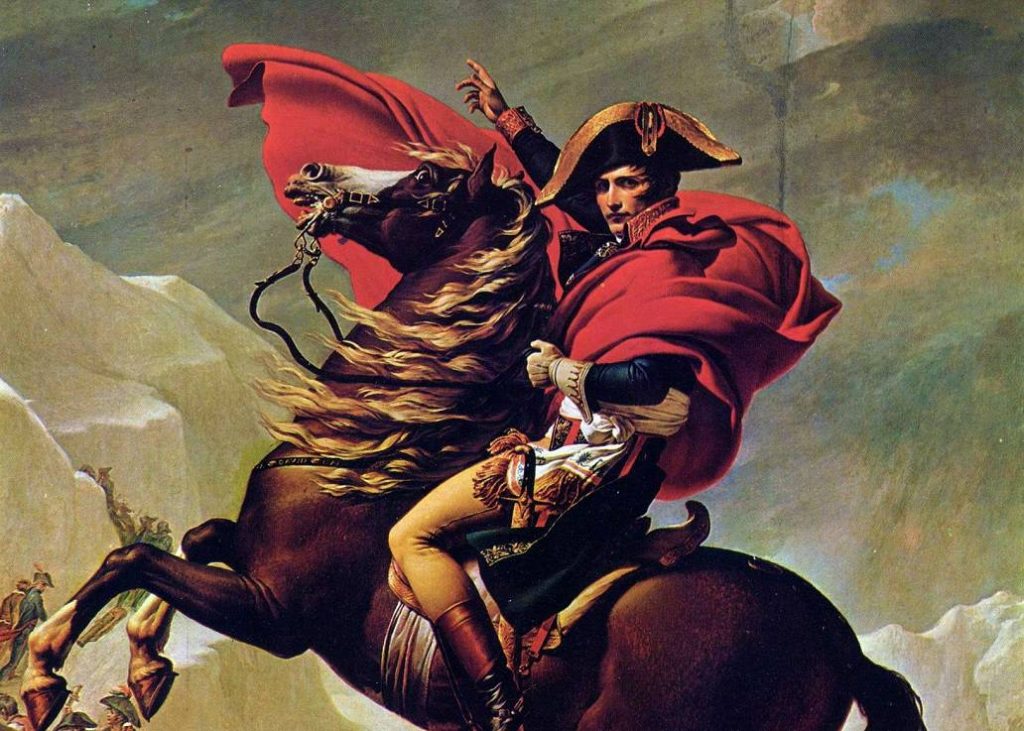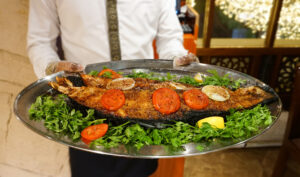Napoleon Bonaparte, born Napoleone di Buonaparte, is one of the most famous figures in French history. A military and political leader, Napoleon first rose to prominence during the French Revolution. He became Emperor of the French in 1804, King of Italy in 1805, and ultimately ruled over most of continental Europe in the early 19th century. It did not last, however, and he was finally defeated at the Battle of Waterloo in 1815. He died in exile six years later on May 5th, 1821. Which means that today is the 200th anniversary of Napoleon’s death. In honour of this occasion, I’ve compiled a list of my personal favourite facts about the first Emperor of the French that you may not know.
1 – Napoleon was not short
At least, he wasn’t as short as British propaganda would have you believe. Historians have determined that Napoleon was about 5’7″, or 1.68m. Today, this would not be considered tall, but at the time, it was perfectly in line with the average French man.
2 – French was not his first language
Napoleon was born on the island of Corsica the year that it was ceded to France. As a child, Napoleon spoke Corsican and Italian, and did not learn French until he was about 10 years old. Although he eventually became fluent, he spoke with a heavy Corsican accent for the rest of his life, and was often mocked for it.
3 – He was not the first in his family to take to the battlefield
Napoleon’s parents were part of the resistance in Corsica, fighting for independence from France. His mother was actually pregnant with Napoleon while fighting alongside her husband. Napoleon himself was a fierce Corsican nationalist until he had a falling out with the resistance leader, Pasquale Paoli, in 1793. His family was then forced to flee to mainland France, where they officially changed their surname to Bonaparte.
4 – He is the reason we can read hieroglyphics
In 1799, while fighting in Egypt, Napoleon’s army discovered what became known as the Rosetta Stone. This stone is inscribed with three copies of an official decree dating back to the 2nd century BCE; one in hieroglyphics, one in demotic Egyptian, and one in Ancient Greek. The Rosetta Stone went on to become the key to deciphering and reading hieroglyphics, and it is considered to be one of the most important artifacts of ancient times.
5 – Napoleon’s relationship with the church was complicated
The Catholic Church was abolished in France during the French Revolution, with countless religious sites, buildings, and monuments desecrated or destroyed. When Napoleon came to power, he restored the Catholic Church, and invited Pope Pius VII to preside over his coronation as Emperor of the French in 1804. However, this event did not go quite the way that the Pope thought it would. When it came time for the Emperor to be crowned, Napoleon took the crown from the Pius’ hands and crowned himself. It was a symbolic gesture, meant to show that Napoleon was above the Pope and church. Napoleon later had Pius VII imprisoned for five years, which likely did not help their relationship.
6 – He was no stranger to scandal
While on campaign in Egypt, gossip reached Napoleon that his wife Josephine was having an affair in his absence. He was horribly distraught at the news, and immediately wrote an anguished letter to his brother about it. Unfortunately, this letter was intercepted by the British, who subsequently published it, causing Napoleon a not insignificant amount of embarrassment.
7 – There are no direct legitimate descendants of Napoleon
He first married Josephine in 1796, but she was unable to produce an heir. They later divorced, and in 1810, Napoleon married Marie-Louise, Archduchess of Austria. They had one son together, who reigned as Napoleon II for a few weeks in 1815, but he later died in 1832 at the age of 21 without any children. His father, however, had many mistresses who bore him illegitimate children, including several sons.
8 – His death is shrouded in mystery
Napoleon died on May 5th, 1821, on the island of Saint Helena. He was 51 years old, and his rumoured last word was Josephine, the name of his beloved first wife. The official cause of death was determined to be stomach cancer, although many close to him claimed that the harsh conditions of his exile contributed to his failing health. However, when his remains were moved to Paris in 1840, Napoleon’s body was found to have been remarkably well preserved, giving rise to the theory that he had died by arsenic poisoning. To this day, historians still debate whether it was arsenic or cancer that ultimately killed the Emperor.
9 – He is beloved in France
Napoleon’s tomb was given a place of honour under the dome of Invalides, and he is revered as a French hero. And fun fact. To this day, it is illegal to name a pig Napoleon in France.
10 – Napoleon once wrote a romance novel
This is hands down my favourite story about Napoleon. At the age of 26, Napoleon wrote a romantic novella titled Clisson et Eugénie. It was never published, and was only discovered after his death. However, today, it is absolutely available online to read. And yes, I’ve read it, and yes, I highly recommend it. Just to say that you have.

Laura Moore is a professional storyteller who loves history and the many stories that make Paris one of the most fascinating cities in the world. Join one of her signature tours to learn the story of a city.



